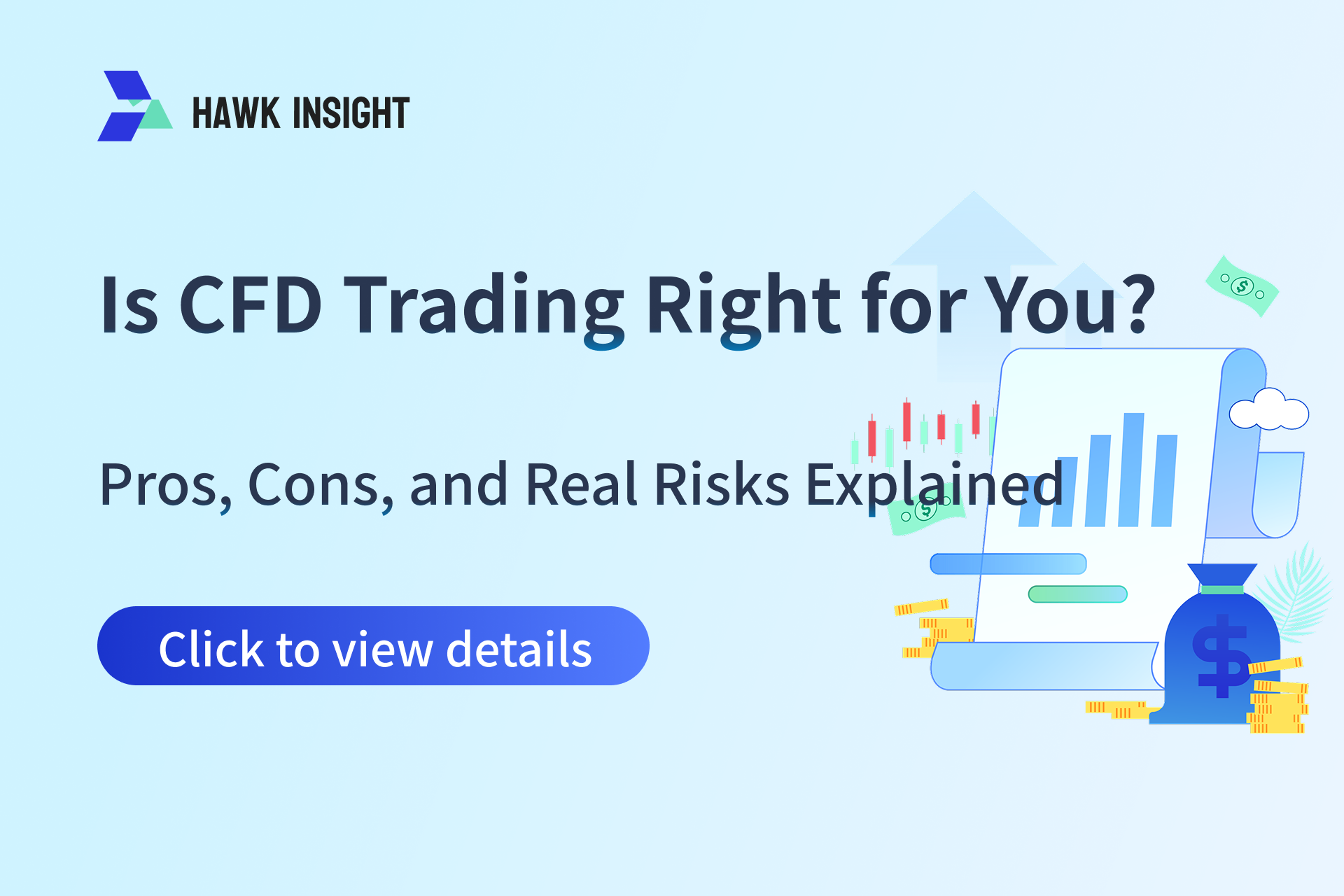Is CFD Trading Right for You? Pros, Cons, and Real Risks Explained
Curious about CFD trading? Learn the real pros, cons, and risks of contracts for difference. Discover if it’s safe, profitable, or suitable for your trading goals.

Introduction: CFD Trading Sounds Powerful—But Is It for You?
Contracts for Difference (CFDs) promise high leverage, fast trades, and the ability to profit from both rising and falling markets. But beneath the flexibility lies a layer of complexity—and risk—that traders often overlook.
If you’re wondering whether CFD trading is safe, or trying to weigh the pros and cons of CFD trading, this guide is your roadmap. We’ll break down how CFDs work, what you stand to gain or lose, and how to determine whether CFD trading is right for you.
1. What Is CFD Trading—and How Does It Really Work?
CFD stands for Contract for Difference. Instead of buying the actual asset (like a stock or gold), you’re entering into a contract with a broker to speculate on the asset’s price movement.
You don’t own the asset—you’re simply betting on its rise or fall. Profit (or loss) is determined by the difference in price from when you enter the trade to when you exit it.
-
Go long: buy when you expect the price to rise
-
Go short: sell when you expect the price to fall
-
Use leverage: amplify gains with a small margin—but losses too

| Aspect | CFD Trading | Stock Investing |
|---|---|---|
| Asset Ownership | ❌ No ownership, just price speculation | ✅ Own the actual shares |
| Short Selling | ✅ Bidirectional trading | ❌ Typically only long |
| Leverage | ✅ Usually 1:10 to 1:30 | ❌ Generally none (unless margin financing) |
| Holding Costs | Overnight fees apply | No overnight fees |
| Trading Costs | Spreads / commissions / slippage | Stamp duty / commissions / platform fees |
| Risk Profile | High risk, high reward—best for short-term | More stable—suitable for mid/long-term |
Three Common Misconceptions: Have You Fallen for Them?
| Common Misconception | Reality |
|---|---|
| CFD is gambling | With strategy and discipline, it’s a tool for hedging or speculation |
| Higher leverage means higher profits | It can also lead to faster liquidation—risk is proportional |
| All CFD platforms are the same |
Big differences in regulation, spreads, fees, and execution—choosing the wrong platform can cost you |
Reminder: Always choose a well-regulated platform, read the terms carefully, and watch for hidden costs.
Benefits of CFD Trading: Flexibility, Speed, Global Access
As a flexible financial instrument, CFDs offer the following major advantages:
-
High capital efficiency: Leverage of 1:10 to 1:30 boosts capital use
-
Bidirectional trading: Opportunities whether markets rise or fall
-
Diverse asset classes: Trade forex, gold, oil, indices, and stocks
-
Low entry barrier, fast account opening: Most platforms support online account setup and demo account trials
| Item | CFD (Contract for Difference) | Stocks | Futures Contracts |
|---|---|---|---|
| Leverage | Yes (up to 1:30) | None / Limited (margin financing) | Yes (higher leverage, typically 1:10–1:50) |
| Short selling | Allowed | Usually not allowed | Allowed |
| Trading hours | Mostly 24/5 | T+1, weekdays only | Varies by exchange sessions |
| Expiration date | None | None | Yes |
| Regulatory requirements | Varies significantly by platform | Strict (regulated by exchanges) | Strict (regulated by exchanges) |
| Suitable for | Risk-tolerant, short-term traders | Long-term investors | Professional or speculative traders |
The real risks of CFD trading: losses come faster than you think
Despite the flexibility, CFD trading carries significant risks. Here are key ones to be aware of:
-
Leverage amplifies risk: Investing $1,000 with 10x leverage, a 10% drop wipes out your account
-
Spreads and overnight fees eat into profits: Frequent trading and holding positions incur costs
-
Psychological traps: Greed and fear lead to chasing highs, panic selling, or overleveraging
-
Platform risks: Unregulated platforms may manipulate prices, delay order execution, or impose slippage
Reminder: The real danger isn't market volatility — it's underestimating its speed and your emotional response.
Are you suited for CFD trading? Use this checklist to assess yourself
Use the following questions to evaluate whether CFD trading is right for you:
| Self-assessment questions | Your answer |
|---|---|
| Can you accept losing more than 50% or even all of your capital? | ✅/❌ |
| Are you familiar with basic concepts such as leverage, stop loss, and slippage? | ✅/❌ |
| Do you have trading experience or have used a demo account before? | ✅/❌ |
| Do you have a clear risk control strategy and strong emotional discipline? | ✅/❌ |
Recommendation: If more than two items are marked as ❌, we recommend starting with a demo account for practice.
How to Start CFD Trading Safely?
Choosing the right platform and starting scientifically are key to avoiding early liquidation:
-
Choose a regulated platform: such as FCA (UK), ASIC (Australia), or CySEC (Cyprus)
-
Start with a demo account: to get familiar with the trading system and psychological rhythm
-
Practice with small positions initially: limit risk per trade to within 5% of total capital
-
Set stop-loss mechanisms: cultivate a disciplined trading habit
Platform Comparison: Mainstream CFD Trading Platforms
| Platform | Regulator | Minimum Deposit | Max Leverage | Asset Coverage | Demo Account |
|---|---|---|---|---|---|
| eToro | FCA | $100 | 1:30 | Forex/Indices/Crypto | ✅ |
| IG Group | FCA | $250 | 1:30 | All categories | ✅ |
| Plus500 | CySEC | $100 | 1:30 | Multiple assets | ✅ |
Recommended reading: Top CFD Trading Platforms in 2025
Our View on CFD Trading
CFDs are a double-edged sword: suitable for experienced traders with strong discipline and risk awareness. However, blindly chasing leverage and profits may lead to significant losses.
Our recommendations:
-
If you prefer long-term and stable investments, choose ETFs or physical stocks.
-
If you're willing to take high risks and enjoy short-term trading, CFDs can be a strategic tool—but always start with a demo account.
Frequently Asked Questions (FAQ)
Q1. Is CFD trading safe for beginners?
A: With a demo account, low leverage, and proper risk control, risks can be minimized.
Q2. Can I lose more than my initial deposit in CFD trading?
A: Yes, in extreme market conditions and without stop-loss, it's possible.
Q3. What are the hidden costs in CFD trading?
A: Spreads, commissions, overnight fees, and withdrawal fees should all be considered.
Q4. Is CFD trading legal?
A: Yes, it is legal, but it's crucial to choose a properly regulated platform.
Q5. How is CFD trading different from traditional stock trading?
A: You don’t own the underlying assets; leverage can be used, and short selling is supported.
Conclusion: Choose what suits you best
CFD trading is not a scam, nor is it a shortcut to getting rich. Understanding its rules, risks, and mechanisms is the responsibility of every trader. Don’t let the market teach you the hard way—use this article and demo trading as your starting point to develop a strategy that fits your own style.
[Related Reading] What is CFD Tax??
[Related Reading] What is a contract for difference (CFD) broker?
[Related Reading] CFD Trading Explained: What Is It and How Does It Work?
·Original
Disclaimer: The views in this article are from the original Creator and do not represent the views or position of Hawk Insight. The content of the article is for reference, communication and learning only, and does not constitute investment advice. If it involves copyright issues, please contact us for deletion.